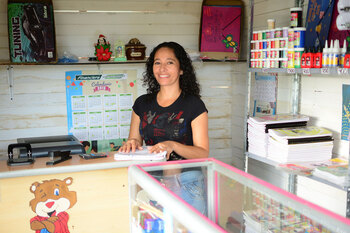Economic integration of internally displaced people and the host community
PROINTEGRA – Economic integration of internally displaced persons and support for host communities in Norte de Santander, Santander, Meta und Caquetá, Colombia
-
Commissioning Party
German Federal Ministry for Economic Cooperation and Development (BMZ)
-
Country
-
Lead executing agency
More
-
Overall term
2015 to 2025
-
Products and expertise
Security, reconstruction and peace

Context
For more than 50 years, Colombia was gripped by armed conflict. The peace accord signed in 2016 between the guerrilla organisation FARC (Fuerzas Armadas Revolucionarias de Colombia) and the Colombian Government has not yet brought total peace to the country. The root causes of the conflict persist – including unequal access to land, and human rights violations.
More than eight million Colombians have been displaced within their own country. Most of them live in slums on the outskirts of cities and have little access to public services. Few of those affected receive adequate psychosocial support to help them process their often traumatic experiences – such as murder, abduction, torture and rape. Many displaced people work as street vendors or have informal jobs. They often lack the necessary self-confidence to embark upon a new career. At the same time, they rarely have access to capital to set up a small business. The Colombian Government is working to improve the situation of internally displaced people via employment promotion programmes.
Objective
Internally displaced people and host communities are able to earn a higher income and thus lead self-determined lives.
Approach
The project advises governmental and non-governmental organisations, and provides financing to support services tailored to the needs of the target group. This includes issuing micro-loans to enable people to start businesses and providing initial and continuing vocational training.
The project also supports the city administrations of Cúcuta, Villavicencio and Florencia in recognising informal settlements as official districts. This is a prerequisite for the internally displaced people in these areas to have better access to city services. Additional funding enables more internally displaced people to take part in psychosocial group sessions. In rural areas, the project supports returnees and local people in expanding agricultural production.
Last update: October 2023





